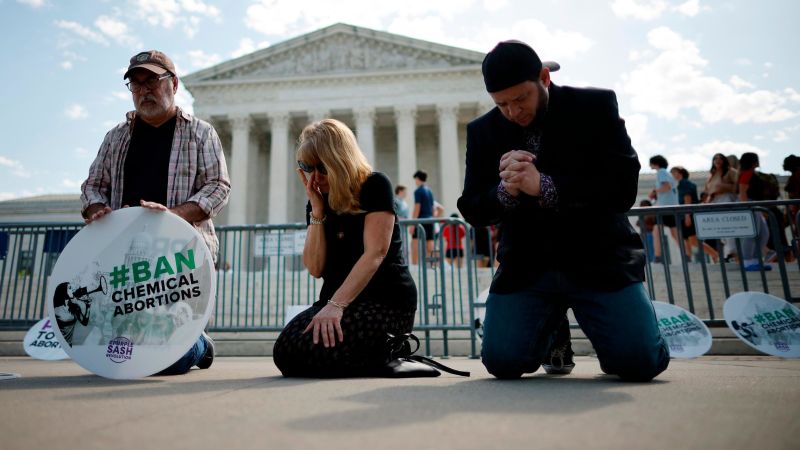The Supreme Court’s decision this week rebuffing an effort to restrict access to mifepristone is unlikely to be the final word on the abortion pill – and the next person to speak will almost certainly be a Trump-appointed judge in Texas at the center of the controversy.
US District Judge Matthew Kacsmaryk will have to decide later this summer if three conservative states that want to continue the fight against the drug can do so in his court. The decision is one of several in coming weeks that will determine whether – and if so, how quickly – the case against mifepristone makes it back to the Supreme Court.
Kacsmaryk, a Donald Trump appointee who previously worked for a Christian legal advocacy group, drew national attention last year by invalidating the Food and Drug Administration’s two-decade-old approval of mifepristone, a sweeping decision that would have removed the drug from the market entirely. Now, both sides in the abortion debate are gearing up for the case to return to his Amarillo courtroom.
“This fight isn’t over,” said Carrie Flaxman, a senior legal advisor at Democracy Forward who has long represented reproductive rights groups. “Access to this medication very much remains at risk.”
A unanimous Supreme Court on Thursday swatted away the current challenge to mifepristone access without reaching the merits of the case. Justice Brett Kavanaugh, a member of the court’s conservative wing, wrote that the anti-abortion doctors and groups that sued over the drug didn’t have standing because they were not injured by its use.
But the court’s decision left open the possibility that some other entity might be positioned to challenge the steps the Food and Drug Administration took in 2016 and 2021 to loosen certain limits on the drug. Those actions included allowing mifepristone to be mailed to patients without a doctor’s visit and allowing it to be used longer in a pregnancy.
“It is not clear that no one else would have standing to challenge FDA’s relaxed regulation of mifepristone,” Kavanaugh wrote.
By spiking the claims on procedural grounds, the high court avoided weighing in on the merits of the anti-abortion advocates’ arguments about how the pill has been regulated. If opponents of the abortion pill can overcome the procedural hurdles to get the justices to consider the substance of their case, they may find some sympathy with the conservative majority that just two years ago overturned Roe v. Wade.
Even before the Supreme Court decided the case, three conservative states – Missouri, Idaho and Kansas – had sought to intervene to challenge the drug alongside the doctors and anti-abortion groups.
Missouri Attorney General Andrew Bailey, a Republican, said he is “moving forward undeterred” with his effort to pursue the case in Texas.
An immediate question for Kacsmaryk is whether the states can continue to do so in his court. Generally, parties must be able to justify filing lawsuits in a specific federal court. The doctors and anti-abortion groups who sued over mifepristone incorporated a group called the Alliance for Hippocratic Medicine in Amarillo months before their lawsuit.
The groups’ move to bring the case in Amarillo, a far-flung court division in Texas’ panhandle, was among the most controversial aspects of the lawsuit. Kacsmaryk is virtually guaranteed to hear every case that is filed there, and his courthouse has become a favorite option for conservative litigants and states seeking to halt the Biden administration’s agenda.
On the bench, Kacsmaryk has handed down a series of rulings killing policies from President Joe Biden’s administration. He has ruled against the administration’s attempt to end the so-called “Remain in Mexico” program, for instance, and rejected its effort to use a provision of Obamacare to protect gay and transgender healthcare workers from discrimination.
Earlier this month, Kacsmaryk blocked the Biden administration from enforcing in four states a federal rule that requires people who sell firearms online and at gun shows to conduct background checks on their potential customers.
In the mifepristone case, Kacsmaryk’s initial ruling was notable not just for its sweeping nature but in how he embraced the anti-abortion movement’s sensational rhetoric about the procedure. Kacsmaryk’s decision on mifepristone was later narrowed by a federal appeals court to deal only with the subsequent steps the FDA took to make mifepristone easier to obtain.
Breaking down major Supreme Court decision on abortion drug
As the administration’s appeal of Kacsmaryk’s abortion ruling played out at the Supreme Court, the trial judge granted the three states’ bid to intervene in the legal challenge in his court. With the Supreme Court now ruling that the underlying litigation must be tossed because the doctors and groups don’t have standing to sue, it’s not clear that Missouri would be able to continue its lawsuit in Kacsmaryk’s court in Texas.
“This lawsuit should not be permitted to continue in Amarillo, because now that the Supreme Court has found that the original plaintiffs lacked standing, that means the case was defective from the start,” Julia Kaye, senior staff attorney for the ACLU, said.
The groups fighting mifepristone argue that the Supreme Court’s decision shouldn’t affect the states’ ability to sue.
The “ruling does not impact the states below,” said Erin Hawley, senior counsel at Alliance Defending Freedom, the conservative group that represented the doctors at the Supreme Court. “I would expect the litigation to continue with those states raising different standing arguments than made by our doctors.”
Aides to the attorneys general in Missouri, Idaho and Kansas did not respond to a request for comment.
If Kacsmaryk decides that those states cannot continue their lawsuit in his courthouse in Texas, those attorneys general – and perhaps Republican leaders of other states – may look for a friendly courthouse elsewhere to file a similar challenge. However, in most federal courthouses in other states, their lawsuit would be randomly assigned to one of multiple judges – not all of whom would be stalwart conservatives.
States may also lose on standing
In the mifepristone case, the anti-abortion doctors who sued claimed that they faced the risk of being forced to treat patients dealing with complications from the drug, such as heavier-than-expected bleeding. Triaging those women, they said, had a substantial impact on their practices. Both the FDA and several medical groups, including the American Medical Association, told the Supreme Court that mifepristone is safe.
Some said they had been called on to perform post-medication abortion procedures they said violated their beliefs. But the Supreme Court knocked that argument aside, noting that federal law already allows doctors to avoid performing procedures that violate their conscience.
The states make a different argument on standing: That state-run hospitals and insurance programs have to pay the cost for adverse effects from the drug.
Those kind of claims are heavily debated but even bank shot efforts by states to challenge federal action have sometimes found a receptive audience at the Supreme Court. Last term, a 6-3 majority shot down Biden’s student loan forgiveness program. To do so, the court determined that Missouri could establish standing because a quasi-government loan servicing entity would lose out on an estimated $44 million in fees from loans that would have been forgiven under the plan.
Adam Unikowsky, a veteran Supreme Court litigator who has closely followed the mifepristone case, predicted it will be hard for the states to get the issue back before the Supreme Court. Even if they can keep the current case going in Kacsmaryk’s court – a tall order – states will have to convince lower courts that they were injured by the expanded access to mifepristone.
The Supreme Court’s decision this week doesn’t explicitly foreclose that possibility, Unikowsky said, but it also did not make the path any easier.
“They’re leaving the door barely ajar for someone else to give it a shot,” he said. But Unikowsky said he believes the states’ claim “is still weak on standing.”
Jaime Santos, co-chair of the appellate and Supreme Court litigation practice at the law firm Goodwin, predicted that the states are “going to have a very hard time – and probably an impossible time” continuing the case against the FDA’s actions.
If the states try to argue that they’ll have to pay for women who wind up in the emergency room after taking mifepristone, she said, “that’s just the kind of speculative injury that Justice Kavanaugh said isn’t enough.”
Read the full article here



